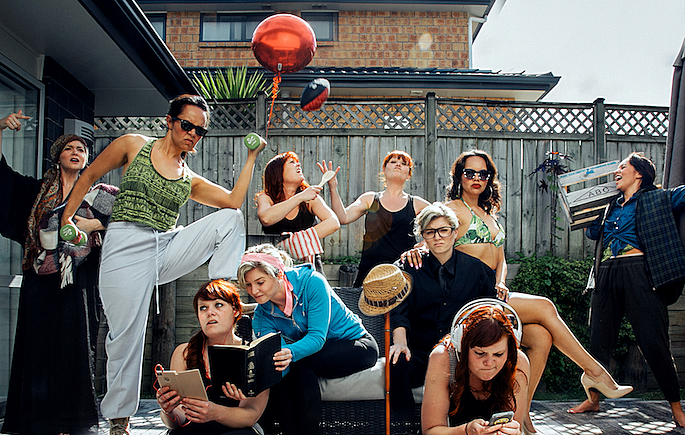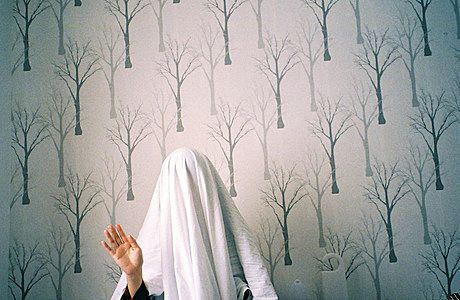Tending the Vines: A Review of deVINE
deVINE, a new play by RECollective is the story of two sisters; Bobby and Blair, chalk and cheese, as they reunite at the deVine whānau vineyard on the back of an emergency. Madeleine de Young reviews deVINE, a play about a family's reaction and response to mental illness in their own backyard.
The intimacy of a whānau can be both a warm embrace and a thorn in one’s side. It gives breath to interactions that can be raw and unapologetic while simultaneously reserved - confused. We are both our most honest and our most guarded with those we love. Our best and our worst. Madeleine de Young reviews deVINE, a play about a family's reaction and response to mental illness in their own backyard.
deVINE, a new play by RECollective is the story of two sisters; Bobby and Blair, chalk and cheese, as they reunite at the deVine whānau vineyard on the back of an emergency. While Bobby has been there for the hard times, Blair has been living in Auckland and neither see eye to eye on how to move forward. It is a dance through pain and anger for the two whose relationship as adults have been defined by trauma that they won’t or can’t discuss. As they attempt to build bridges, their elderly mother reminisces back to memories of a better time, of the epic love story amidst the glowing vines that brought the sisters into being.
It is the first production from the RECollective team; made up of actors Cian Elyse White, Romy Hooper and Esmee Myers, guest directed by Morgana O’Reilly. White and Hooper take on the key roles of Blair and Bobby as well as the young men of the next generation while Myers plays the Matriarch, Nana deVine and Bobby’s daughter, Esther. They move effortlessly through the myriad of roles in an intimate and painfully relatable glimpse into the life of a whānau who aren’t coping.
RECollective aim to create ‘Theatre of Courage’ - theatre that promotes discussions around mental distress and its impact on everyday life. In deVINE intergenerational mental distress and trauma is hinted at, but never laid bare. The audience is allowed to experience the sensation of pain that has passed from one generation to the other - but it is never discussed. The whānau hint at painful memories from their past - a brother passing too soon, an accident on the vineyard and even the now decrepit state of the vines that once made up so much of their whānau identity.
At deVINE’s conclusion, the audience is left bereft - wanting a resolution that can’t and won’t be given. For the sisters, too much has happened, too much time has passed. The effect of this is that discussions on mental welfare are left for the floor and not the stage.
Far from being a negative, this makes deVINE stronger - it is frustrating for sure, but realistic. Watching the deVine sisters make war and peace over glasses of wine and baskets of washing, you see everyday scenes from whānau around the country. To know those kōrero are to know that old wounds never truly heal, so the question really is how to love throughout it.
That familial commitment is what holds deVINE together. Whether it’s the sisters gritting their teeth as they attempt to play nice or as Esther tends privately to the vines in the hope that her own small actions may heal them all. It’s in the story that Esther retells as she and the boys listen to the sisters screaming bloody murder - ‘Remember that time that Blair smashed a plate and Mum smashed a plate too so she wouldn’t feel bad?’
As far as discussions around mental health go - the deVine family are far from perfect - but when navigating the aches and pains of mental health - is there such a thing as ‘perfect’? For all their imperfections, the deVine whānau hold a mirror to many of us. At its conclusion, there is no telling whether things will be okay - but in the buds of Esther’s newly growing vines there is at least hope, a reminder that even when things aren’t perfect, you can always try to tend the vines and bring some love back to life.
‘The thing Jonathan liked to say about grapes is, they have different personalities. Each one is shaped and moulded by the seasons which grew them.’ - Nana deVine
Note about the production:
The Auckland season of deVINE is a fundraising season before they take the show to Northland for a series of community performances. It is the first of a 10-year vision to create yearly tours to share with rural communities in the hope of supporting and normalising discussions around mental distress in everyday life.
deVINE runs at
The Basement Theatre, Auckland
until Saturday 11 February
For tickets to deVINE, go here

